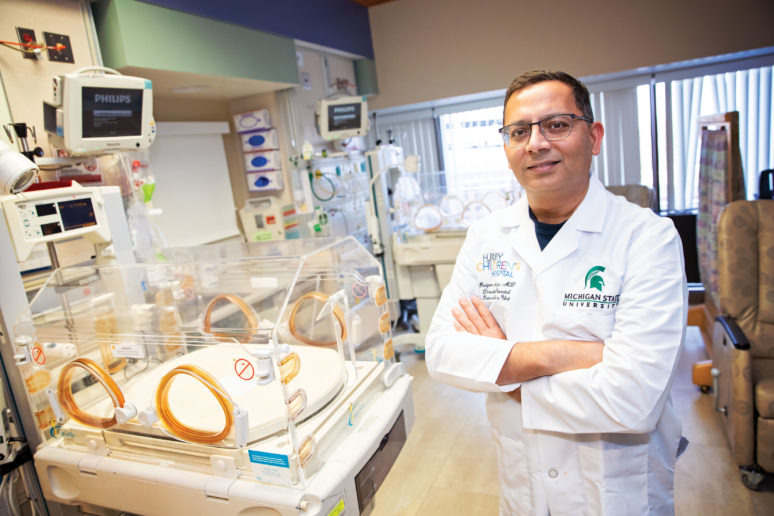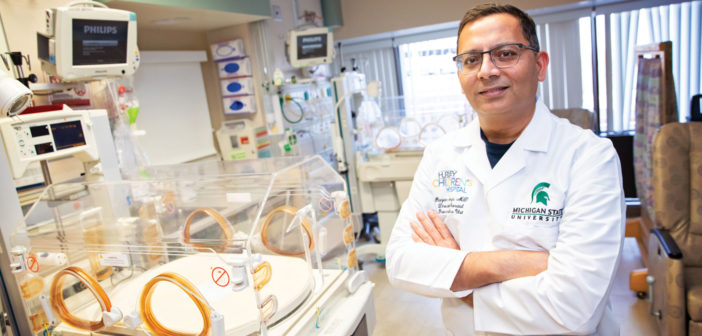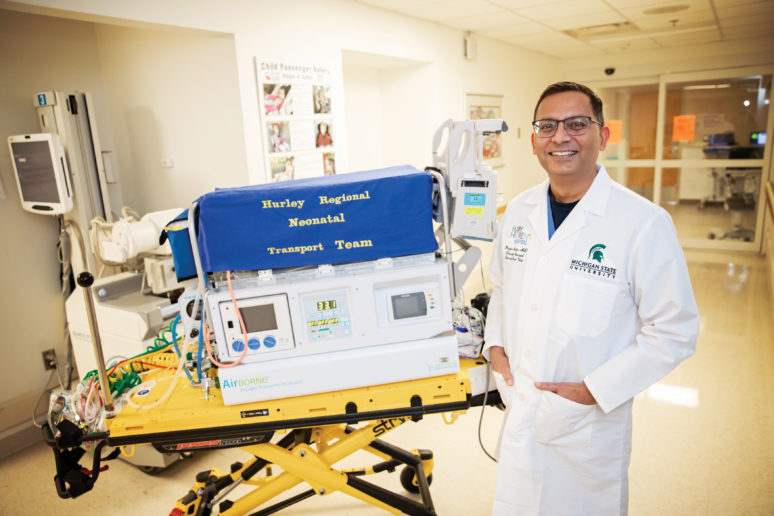Hurley Medical Center is home to this region’s only Level III Neonatal Intensive Care Unit (NICU). Each year nearly 1,000 babies are born prematurely or critically ill, either at Hurley Medical Center or in the surrounding three-county area. For the best chance of survival, these fragile lives require the expert, highly-specialized critical care available only from Hurley Medical Center’s Level III NICU, the highest level of expertise, the most advanced technology and a dedicated and caring staff.
My City Magazine spoke with Dr. Ranjan Monga, MEDNAX-affiliated Neonatologist and Medical Director Neonatal Intensive Care Unit at Hurley Medical Center. He is also Assistant Professor, Department of Pediatrics and Human Development, MSU. Dr. Monga shared his experience about working at the region’s only Level III NICU.
MCM: What does it mean to be a Level III NICU?
Level III allows us to take care of extremely premature or sick newborns. Such units can provide comprehensive care for infants born at all gestational ages and extremely low birth weight (less than 1,000 grams) with critical illness.
MCM: Tell us about the dedicated staff at the NICU and what they do.
Being a Level III unit, all of our staff are highly trained in providing care to critical newborns. We have dedicated nurses, respiratory therapists, registered dietitians, occupational therapists, X-ray techs and pharmacists working together.
“Neonatal-Perinatal medicine is a mixture of science, medicine, art and passion.”
Ranjan Monga, MD
MCM: Can you share about your own experience working in the NICU and what it means to you?
It is hard to summarize the experiences that one could have working in the NICU. Neonatal-Perinatal medicine is a mixture of science, medicine, art and passion. We are always in pursuit of improvement and learning, and finding solutions to problems as they arise and sometimes even before they fully present themselves.
MCM: How many babies are treated at the NICU in a year?
We see 750-800 babies a year, out of which approximately 100 are Very Low Birth Weight (less than 1,500 grams).
MCM: Can you tell me about the parent/child involvement?
We work very hard to give every newborn the best chance for a successful outcome from their NICU stay and one thing that stands out to achieve that result is parent involvement. It is well known that we have the best results when parents are involved – whether it’s participating in morning rounds, asking questions or helping us make difficult decisions on complicated issues. Patient Family Centered Care (PFCC) has a significant advantage for the medical team, parents and, most of all, the patient. We completely endorse and practice PFCC.
 MCM: Tell us about the volunteers at NICU and what they do.
MCM: Tell us about the volunteers at NICU and what they do.
I would consider volunteers (Cuddler Program) a part of our team. I cannot over-emphasize the role a volunteer – from providing comfort by holding a child to helping with daily care of a newborn – to soothing an infant who is withdrawing from mothers’ pain medication and is in discomfort. Cuddlers provide a warm, nurturing, loving and responsive environment individualized to each infant’s needs. I would encourage more awareness in the community to further assist in making this program even more robust and successful.
MCM: Is there a particular case that you would like to talk about?
I can’t choose just one case to mention, out of the so many over my years of work in the NICU. We have had extremely low-birth weight babies, weighing less than one pound, who have had good outcomes. There are newborns who were resuscitated because parents insisted on intervention despite medical advice against it, and those infants did far better than expected. In one case, the parents did not want any resuscitation at 23 weeks of gestation, and then changed their minds as soon as the baby was born, only to have better results than expected or promised – to the point that one would not imagine this normally-grown child at several years of age.
MCM: What role does technology play in the NICU?
We have stayed current and up-to-date with technology, equipment, policies and guidelines. From the latest electronic health records, including Epic® and the MEDNAX proprietary Babysteps® program, to the latest incubators and ventilators – we are constantly using the latest technology to achieve best outcomes possible for the smallest and sickest newborns.
Photography by Kayce McClure















